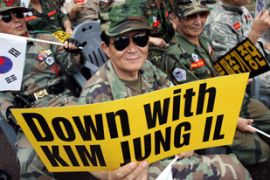Korea talks to eye unification
South Korean president to visit Pyongyang for a rare summit next week.

Jeong Hyung-gon, a research fellow at the Korea Institute for International Economic Policy, said: “South Korea’s economic co-operation is aimed at reducing military tension.”
“A peaceful peninsula has a direct impact on South Korea’s economy.”
South Korea has lived under a military threat from the North, but it also fears that a sudden collapse of Kim’s government, along with the prospect of absorbing its neighbour, would wreck its own economy.
North Korea’s economy has dramatically weakened, while their neighbour has surged.
Hit by massive floods and UN sanctions for conducting a nuclear test in 2006, the country depends on food and oil handouts.
The summit – the second between the two countries since the peninsula was divided after World War Two – will primarily focus on the possibility of unification.
Historic moment
Meanwhile, North Korean residents will reportedly take part in festivities to welcome the leader of South Korea.
Roh is to witness a performance featuring goose-stepping soldiers, dancing schoolgirls and a massive flip card animation section that promotes unification – but under the North’s communist banner.
According to Reuters news agency, Roh will lead a motorcade from Seoul to Pyongyang on Tuesday, and will become the first leader from the South to walk across the heavily patrolled border.
The first summit in June 2000 – also held in Pyongyang – had launched economic and humanitarian projects.
Slow process
Officials have said that Roh might propose new projects to rebuild the North’s infrastructure and develop joint economic zones.
Most South Koreans want unification, but a recent survey has said that three in four want the process to move slowly.
Kim Young-yoon, an economics expert at South Korea Institute for National Unification told Reuters that rebuilding the North’s economy can be described as “unification on an instalment plan”.
“The most important thing in unification is getting rid of the economic gap.”
Meanwhile, critics have expressed concern that Roh may pledge so much in aid that North Korea will feel it can reject incentives offered by regional powers to stop its nuclear arms programme.
During six-nation talks on North Korea’s nuclear disarmament, held in Beijing, envoys had worked to draw up a schedule for the country to permanently disable its reactor, in exchange for 950,000 tonnes of fuel oil.
“The South Korean government had promised the US that inter-Korean engagement would be a half-step behind the six-party talks. But instead, it seems several steps ahead,” said Bruce Klingner, a senior research fellow for Northeast Asia at the Heritage Foundation in Washington.